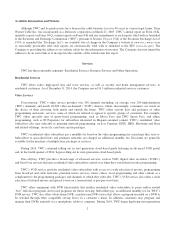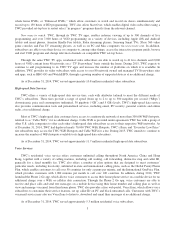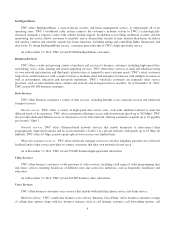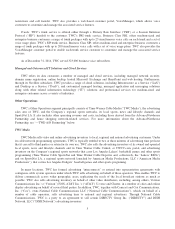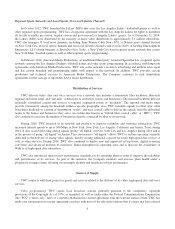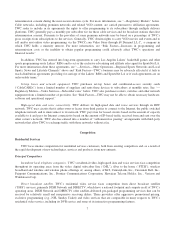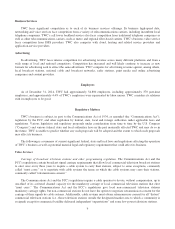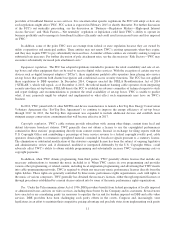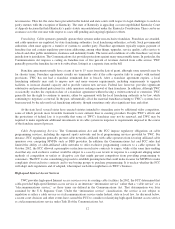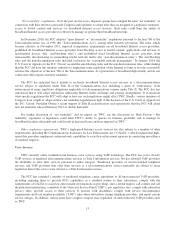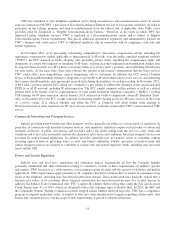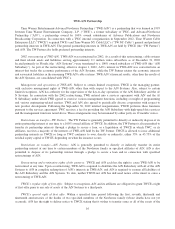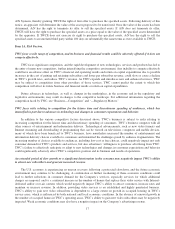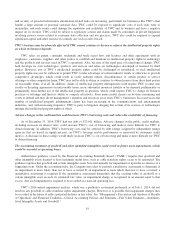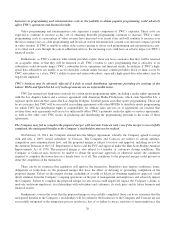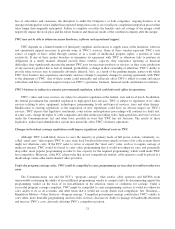Time Warner Cable 2014 Annual Report Download - page 20
Download and view the complete annual report
Please find page 20 of the 2014 Time Warner Cable annual report below. You can navigate through the pages in the report by either clicking on the pages listed below, or by using the keyword search tool below to find specific information within the annual report.tax measures. Thus far, the states have prevailed in the federal and state courts with respect to legal challenges to such tax
parity statutes with the exception of Kentucky. The state of Kentucky is appealing a recent unpublished Kentucky Court
of Appeals decision that held Kentucky’s parity statute unconstitutional under the Kentucky Constitution. There can be no
assurance as to the outcome with respect to cases still pending and ongoing legislative efforts.
Franchising. Cable operators generally operate their systems under non-exclusive franchises. Franchises are awarded,
and cable operators are regulated, by state franchising authorities, local franchising authorities, or both. Such governmental
authorities often must approve a transfer of systems to another party. Franchise agreements typically require payment of
franchise fees and contain regulatory provisions addressing, among other things, upgrades, service quality, cable service to
schools and other public institutions, insurance and indemnity bonds. The terms and conditions of cable franchises vary from
jurisdiction to jurisdiction. The Communications Act provides protections against many unreasonable terms. In particular, the
Communications Act imposes a ceiling on franchise fees of five percent of revenues derived from cable service. TWC
generally passes the franchise fee on to its subscribers, listing it as a separate item on the bill.
Franchise agreements usually have a term of ten to 15 years from the date of grant, although some renewals may be
for shorter terms. Franchise agreements usually are terminable only if the cable operator fails to comply with material
provisions. TWC has not had a franchise terminated due to breach. After a franchise agreement expires, a local
franchising authority may seek to impose new and more onerous requirements, including requirements to upgrade
facilities, to increase channel capacity and to provide various new services. Federal law, however, provides significant
substantive and procedural protections for cable operators seeking renewal of their franchises. In addition, although TWC
occasionally reaches the expiration date of a franchise agreement without having a written renewal or extension, TWC
generally has the right to continue to operate, either by agreement with the local franchising authority or by law, while
continuing to negotiate a renewal. In the past, substantially all of the material franchises relating to TWC’s systems have
been renewed by the relevant local franchising authority, though sometimes only after significant time and effort.
At the state level, several states have enacted statutes intended to streamline entry by additional video competitors,
some of which provide more favorable treatment to new entrants than to existing providers. Despite TWC’s efforts and
the protections of federal law, it is possible that some of TWC’s franchises may not be renewed, and TWC may be
required to make significant additional investments in its cable systems in response to requirements imposed in the course
of the franchise renewal process.
Cable Programming Services. The Communications Act and the FCC impose regulatory obligations on cable
programming services, including the regional sports networks and local programming services provided by TWC. For
instance, FCC regulations generally prevent cable networks affiliated with cable operators from favoring affiliated cable
operators over competing MVPDs such as DBS providers. In addition, the Communications Act and FCC rules had
limited the ability of cable-affiliated cable networks to offer exclusive programming contracts to a cable operator. In
October 2012, the FCC allowed a preemptive restriction on exclusive contracts to expire, while at the same time making
clear that any such exclusive contract would be subject to a case-by-case review in response to a complaint alleging unfair
methods of competition or unfair or deceptive acts that might prevent competitors from providing programming to
consumers. The FCC is also considering proposals to establish presumptions that could make it easier for MVPDs to make
complaints about exclusive contracts and to use buying groups to purchase programming. It is unclear whether the FCC
will adopt such regulations and, if adopted, what impact such rules might have on TWC’s business.
High-speed Internet Access Services
TWC provides high-speed Internet access services over its existing cable facilities. In 2002, the FCC determined that
cable-provided high-speed Internet access service is an interstate “information service” rather than a “cable service” or a
“telecommunications service,” as those terms are defined in the Communications Act. That determination was later
sustained by the U.S. Supreme Court. Under the “information service” classification, the service is not subject to
regulation as either a cable service or a telecommunications service under federal, state or local law. As discussed below,
a recent court decision and other events have caused the FCC to consider reclassifying high-speed Internet access service
as a telecommunications service under Title II of the Communications Act.
12


